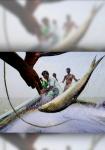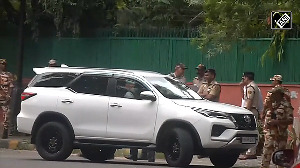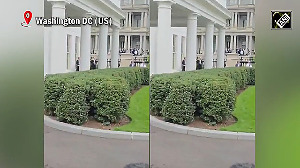Some of the Iraqi officials on the US most-wanted list have landed in American custody after failing to find refuge and encountering Iraqis willing to turn them in for reward money, US officials said on Monday.
Eight of the wanted Iraqi officials depicted on a deck of cards issued by the US military are in custody, while 47 remain at large.
Those in custody include Saddam Hussein's top scientific adviser, two of the ousted Iraqi leader's half-brothers, his former finance minister, his education and scientific research minister and his only surviving son-in-law.
There is also a senior Baath Party official and the most recent catch, announced on Monday, a regional military commander named Mohammed Hamza al-Zubeidi.
Since the fall of Baghdad less than two weeks ago, two of the 55 most-wanted Iraqi officials have surrendered and six have been caught, either by US forces or by non-American elements who turned them over to US authorities.
Although most of the top Iraqi officials have not been captured, some are believed to be still inside Iraq.
They have few places to hide because neighboring countries have either closed their borders or were never inclined to give refuge because of past disputes, American officials said.
Turkey and Saudi Arabia have a long history of tension with Iraq under Saddam, Iran fought a long and bloody war with Iraq, Jordan is friendly with the US, and Syria has closed its borders under pressure from the US.
"Which route do you think they could take?" asked a US defence official.
Saddam's ruling elite may not have had time to dip into the millions of dollars in cash that US forces found stashed in Iraq because Baghdad fell so quickly, US officials said.
They would not specify how much the US was paying for information on the most-wanted, but they said no incentives were being offered to any of the top 55 to turn themselves in.
Those who were surrendering probably believed it was better than living on the run or being captured by angry Iraqis who hated Saddam's rule, officials said.
"There are lots of people looking for them, they know that," said one official.
"They know they are very unpopular with many groups, they know there are some people there who will dish out retribution, and they would rather take their chances in the hands of US and coalition forces than the hands of the people that they have mistreated for so many years," he added.
Some of the wanted Iraqis also may be surfacing as they begin to realize they would inevitably be caught because of the huge manhunt launched by US forces and their allies.
"They may be in fear of internal vigilante action from the Iraqi population, you saw what happened with all the looting last week, emotions run high," a US defence official pointed out.
Whether Saddam survived the two US air strikes aimed at killing him remains unknown and his fate is the subject of intense speculation.
Robert Baer, a former CIA officer who was in Baghdad last week, said he was told by people who know Saddam personally that the deposed Iraqi leader had survived an April air strike that targeted him in a Baghdad neighbourhood.
"I think somebody would have dug him up right now if he died there. They dug up all the bodies, identified all 14," Baer said by telephone from Jordan.





